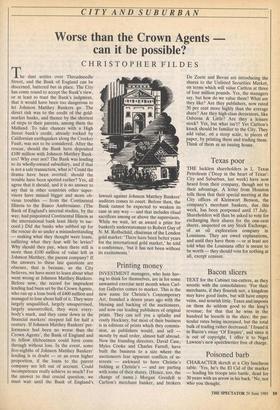CITY AND SUBURBAN
Worse than the Crown Agents can it be possible?
CHRISTO PHER FILDES
The dust settles over Threadneedle Street, and the Bank of England can be discerned, battered but in place. The City has come round to accept the Bank's view, or at least to trust the Bank's judgment, that it would have been too dangerous to let Johnson Matthey Bankers go. The direct risk was to the credit of the gold- market banks, and thence by the shortest of steps to their parents, among them the Midland. To take chances with a High Street bank's credit, already rocked by Californian earthquakes along the Crocker Fault, was not to be considered. After the rescue, should the Bank have deposited £100 million with Johnson Matthey Bank- ers? Why ever not? The Bank was lending to its wholly-owned subsidiary, and if that is not a safe transaction, what is? Could the drama have been averted, should the trouble have been spotted earlier? Yes, all agree that it should, and it is no answer to say that in other countries other super- visors have missed bigger and more ob- vious troubles — from the Continental Illinois to the Banco Ambrosiano. (The Bank of England's internal studies, by the way, had pinpointed Continental Illinois as the international bank least likely to suc- ceed.) Did the banks who subbed up for the rescue do so under a misunderstanding — making what they thought were loans, suffering what they fear will be levies? Why sh,ould they pay, when there still is mote than £100 million of value left in Johnson Matthey, the parent company? If the answers to these last questions are obscure, that is because, so the City believes, we have more to learn about what went wrong at Johnson Matthey Bankers. Before now, the record for imprudent lending had been set by the Crown Agents, who ran up a loan book of £400 million and managed to lose about half of it. They were largely unqualified, largely unsupervised, largely uncontrolled, they were every- body's mark, and they came down in the financial markets' steepest fall for half a century. If Johnson Matthey Bankers' per- formance had been no worse than the Crown Agents', the Bank of England and its fellow lifeboatmen could have come through without loss. In the event, some five-eighths of Johnson Matthey Bankers' lending is in doubt — or an even higher proportion, if the loans to the parent company are left out of account. Could incompetence really achieve so much? For the answer to that crucial question, we must wait until the Bank of England's lawsuit against Johnson Matthey Bankers' auditors comes to court. Before then, the Bank cannot be expected to weaken its case in any way — and that includes ritual sacrifices among or above the supervisors. While we wait, let us award a prize for bankerly understatement to Robert Guy of N. M. Rothschild, chairman of the London gold market: 'There have been better years for the international gold market,' he told a conference, 'but it has not been without its excitements.'


























































 Previous page
Previous page